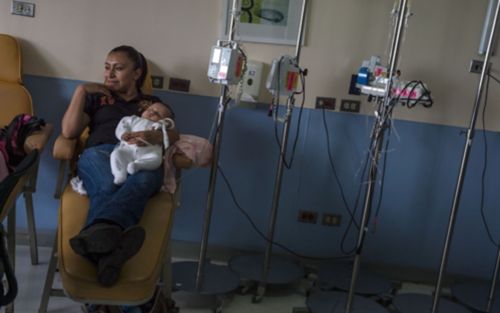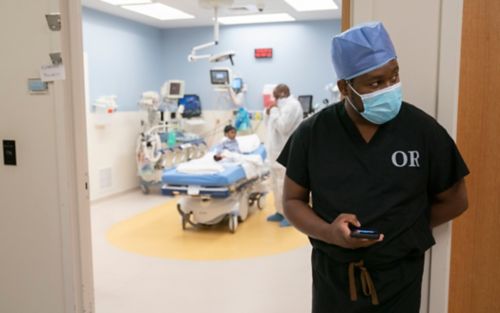St. Jude Family of Websites
Explore our cutting edge research, world-class patient care, career opportunities and more.
St. Jude Children's Research Hospital Home

- Fundraising
St. Jude Family of Websites
Explore our cutting edge research, world-class patient care, career opportunities and more.
St. Jude Children's Research Hospital Home

- Fundraising
Building a platform to bring cancer drugs to children worldwide
Reliable access to safe, effective medicine is an essential part of any plan to improve cancer survival. But that requirement is out of reach for many doctors and hospitals, particularly in low- and middle-income countries. Quality, affordable pediatric chemotherapy agents often pose an even greater challenge.
St. Jude Children’s Research Hospital and World Health Organization have accepted the challenge. In December 2021, St. Jude and WHO leaders announced plans to dramatically increase access to childhood cancer medicines around the world.
The Global Platform for Access to Childhood Cancer Medicines is the centerpiece of those efforts. The platform is designed to provide an uninterrupted supply of quality-assured childhood cancer medicines to low-resource countries. St. Jude is making a six-year, $200 million investment to create the platform, which will supply medicines at no cost to countries that take part. This is the largest financial commitment to date addressing global access to childhood cancer medicines.
The pilot phase will include 12 countries. By 2027, organizers aim for the platform to provide safe and effective cancer medicines to approximately 120,000 children in 50 low- and middle-income countries. The effort is expected to scale up from there. Other partners in building the platform include the International Society of Paediatric Oncology and Childhood Cancer International.
“This will be one of the most important things St. Jude Children’s Research Hospital ever does,” said James R. Downing, MD, St. Jude president and CEO. “This is a program that will provide a cornerstone of quality care to children everywhere in the world.”
Cost and a fragmented supply chain
Amon Ngongola, MD, sees such children every day at the University Teaching Hospital in Lusaka, Zambia. Ngongola is one of only 18 pediatric surgeons in the nation of 18.3 million people. His practice includes young cancer patients, which is why Ngongola happened to be at St. Jude with one of his patients when plans for the global platform were announced. Zambia will not necessarily be among the first 50 countries selected to participate in the platform. However, Ngongola understands the need firsthand.
“Unfortunately, chemo drugs are not readily available all the time in the country or even at our cancer hospitals,” Ngongola said. The reasons include cost and a fragmented pharmaceutical supply chain that doesn’t prioritize cancer drugs. But when treatment is interrupted, the risk increases that cancer will return more aggressively than ever.
“At some point we end up having parents spend out-of-pocket money to buy cancer drugs,” he said. “That is very disheartening. They’ve had to spend everything they had to come to the hospital. Then to ask them to find money to buy cancer drugs is a bit too much.”
Ngongola has stepped in to find and pay for patients’ medication when the hospital’s supply is depleted midway through treatment.
Families who cannot afford to purchase the medicine sometimes wait in the hospital hoping medications will become available. Others give up and go home even though their child still has cancer.
“I think the platform will really go a long way to help the fight against childhood cancer,” Ngongola said.
This platform will provide end-to-end support by capturing the global demand for the medicine to help shape the market, assisting countries with the selection of medicines, developing treatment standards and building information systems to track the provision of effective care and drive innovation.
A life-and-death disparity
Each year, an estimated 400,000 children worldwide develop cancer. More than 80% of those children live in countries that lack reliable access to cancer medicines. This situation contributes to survival rates of less than 30%, compared with 80% in high-income countries.
“Unless we address the shortage and poor quality of cancer medicines in many parts of the world, there are very few options to cure these children,” said Carlos Rodriguez-Galindo, MD, executive vice president and chair of the St. Jude Department of Global Pediatric Medicine and director of St. Jude Global. “Health care providers must have access to a reliable source of cancer medicines that constitute the current standard of care. We at St. Jude, with our co-founding partners at WHO and many vital partners around the world, can help achieve that.”
A WHO survey published in 2020 found that just 29% of low-income countries report that cancer medicines are generally available to their populations. That compares with 96% of high-income countries. By consolidating the needs of children with cancer globally, the new platform will curtail the purchase of sub-standard and falsified medicines. Many of these unauthorized purchases often occur due to the limited capacity of national regulatory authorities.
A collaboration grows
The new platform builds on the Global Initiative for Childhood Cancer, which St. Jude and WHO launched in 2018. That is when St. Jude committed $15 million to create the global initiative shortly after becoming the first and only WHO Collaborating Centre for Childhood Cancer.
The global initiative supports more than 50 governments in building and sustaining local cancer programs. The effort aims to increase survival to 60% for six of the most common pediatric cancers by 2030. The Global Platform for Access to Childhood Cancer Medicines aligns with the Global Initiative. Activities implemented through this new effort are expected to contribute substantially to achievement of the initiative’s goals.








